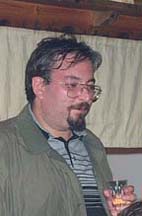
August 2003
LFI and Others Were Targeted
A Band of Political Impostors and Swindlers in Ukraine
News of this rip-off operation came to light in late July, when the SPGB received a warning from Russian “council communists,” the Group of Proletarian Revolutionary Collectivists (GPRC), that its Ukrainian group was a fraud. The SPGB was able to establish that the leader of “their” group, the World Socialist Party (WSP) of Ukraine, and delegate to the 2002 WSM conference, known to them as “Semyon Shevchenko,” was identical to Oleg Vernik of the CWI’s Robitnichi Sprotiv (RS – Workers Resistance), who even ran for electoral office for the RS. The IBT subsequently identified the same person as Vitaliy of “their” section, the Young Revolutionary Marxists. Contacted in mid-August by the IBT who furnished photos of members of the “YRM,” we were able to identify at least six members of the Revolutsionnaya Kommunisticheskaya Organisatsiya (RKO – Revolutionary Communist Organization), which had fused with the LFI in August 2001. The main leader of the RKO, known to us as “Vasily Dmitrulin,” was the same as Boris Pastukh, the head of the IBT group. Seeking further information, we contacted the CWI, SPGB and other groups affected by the fraud, and demanded explanations from the “RKO,” which unsurprisingly did not respond.
Given the unambiguous nature of the accumulated evidence, the executive committee of the League for the Fourth International states that the fusion with the Ukrainian “RKO” is null and void. We are publishing photos of the two main leaders of this gang, Pastukh and Vernik, in order to warn others to beware of these scoundrels. At the same time, we are continuing to pursue efforts to obtain information as to the extent and origins of the hoax perpetrated against the LFI and other left organizations. Whether this operation was motivated by cynical nationalism, by motives of purely personal gain or was part of a police provocation (or some combination of these), such elements must be ruthlessly exposed and driven out of the workers movement.
Swindlers




The person who called himself “Vasily Dmitrulin” in the “RKO” (left) is the same as Boris Pastukh (also known as “Alexander Sherbakov”) in the “YRM” (second from left), a/k/a “Ivan” in the “WSP” and “Ihor” in the “UWG” (affiliated with News and Letters). The person who presented himself as “Mikhail” in the “RKO” (second from right) is the same as Oleg Vernik of the RS (right), a/k/a “Vitaliy” in the “YRM,” “Yakuv” in the “RWO” (affiliated with the LRP/COFI), “Semyon Sevchenko” in the “WSP,” and “Viktor” in the “UWG.”
The “RKO” initially contacted us in the early fall of 2000. After almost a year of extensive correspondence concerning key programmatic issues, a representative of the LFI traveled to Kiev in the summer of 2001 where talks were held over the course of a week. This led to the preparation of a declaration of fusion in which the “RKO” joined the League for the Fourth International. An issue of a paper, Internatsionalist, in Ukrainian and Russian, was published that November. However, despite two further visits by comrades of the LFI in 2002, communication with the group proved sporadic, causing us growing concern.
We had had suspicions for the last nine months that something was amiss with the “RKO” when we repeatedly requested that they send us a copy of the alleged second issue of their paper, which they claimed was published last November. In December, a European comrade of the LFI visited Kiev for a number of days, but was unable to meet with any of the leaders, although he had been invited. In response to our inquiries about this strange absence, we were informed that their leader “Vasily” had suffered a heart attack, and was reportedly hospitalized for months, during which time we were not able to correspond with or speak with him. Moreover, those who responded to our messages used different names than those we were familiar with; when we skeptically queried them, they blithely said that they had just changed pseudonyms. They did send us leaflets they claimed to have issued in antiwar protests, but they did not have the position of the LFI on Israel-Palestine, which had been a subject of considerable discussion. When we questioned this, there was no response.
Finally, when we tried to send a European representative of the LFI to Ukraine to see what was going on, we were told twice that it was a bad time. The claim was made that there was generalized police repression against the left. When we probed for more information, since we could find no other reports of such a wave of repression, we were told that things were extremely dangerous, with people being hauled in for questioning, hard drives removed from computers, etc., and if our representative came they might not return for some time (i.e., be arrested). Clearly, all these excuses were inventions to prevent us from finding out what was behind the strange behavior of the group. It turns out that it was considerably stranger than we had imagined. In retrospect, the operation even had some rather comical aspects, such as the irate complaints from the IBT’s “YRM” that the “RKO” had slandered them in claiming they were part of a popular front together with bourgeois political currents, or the denunciations of the opportunism of the CWI’s “RS” by several of the phony groups.
As for the financial aspect, while the amounts from a particular group may have been small (in our case they were limited to funds for a computer and the first issue of the “RKO” paper), taken together it may have been a more substantial sum, especially in an impoverished country with monthly wages around $50. There is also the possibility that one objective was to discredit the groups targeted. Yet the tendencies affected were quite diverse, ranging from the Trotskyist LFI to various pseudo-Trotskyist outfits (CWI, IBT, L5I), the neo-Shachtmanite LRP/COFI, the social-democratic SPGB as well as latter-day De Leonists and Bordiguists. Or did the scheme start with members of a leftist group deciding to supplement their incomes with some underhanded “creative financing”? The mode of operation, and particularly the training the “members” had to go through to play their parts in the charade, have the hallmarks of a classic “false flag” operation, in which agents of one power pretend to be representatives of another. This suggests a possible relation to intelligence agencies, either directly or involving former operatives “privatizing” their activities and putting prior training to profitable use.
We do not now know the answers to these questions, and may not know for some time. But however odd the particulars may be, it is important to put this affair in historical context. Revolutionary organizations have often been beset by adventurers, swindlers, police agents, quick-change artists and charlatans of all kinds. In some cases, they have gained prominenсe and played a tragically treacherous role, while others, as in this case, are minor actors. We have run into dubious elements on other occasions who have tried to pass themselves off as different things to different people. While in this case we did not detect their deception until it was revealed, reportedly by a defector from the gang itself, the Marxist response has always been to shine the light of revolutionary politics on the dark recesses where such figures ply their wares.
The appearance of shady characters is particularly frequent after a defeat of the proletariat, when the workers movement is in a phase of decomposition. This is the situation today in the countries of the former Soviet Union. A recent novel, The Corrections, by Jonathan Franzen relates an elaborate dot.com swindle set in the post-Soviet Baltic countries, in which young political entrepreneurs raise money via a Web site (lithuania.com), bilking Internet investors into buying shares in a fictitious Lithuania, Inc. The novel reflects the frenzy of “funny money” operations, pyramid schemes and similar swindles that have flourished in the aftermath of counterrevolution in the USSR and East Europe. These Ukrainian con men reflect the same mentality, and it is nothing new.
Following the defeat of the 1848 revolutions in Europe, the remnants of the Communist League were beset by adventurers (Willich and Schapper) who sought to finance their “revolution” with a loan from a New York bank, police agents who supplied falsified minutes of party meetings and perjured testimony to anti-communist trials, and pseudo-democratic Bonapartist agents (Vogt) who sought to frame the communist leaders with smears and slanders. Marx responded with his sharply polemic pamphlets, The Cologne Communist Trial and Herr Vogt. The tsarist secret police, the Okhrana, managed to recruit and place agents in the Bolshevik party, including one Roman Malinovsky, who on Lenin’s nomination became a member of the Bolshevik central committee and leader of its Duma (parliamentary) fraction. Despite a party investigation, the facts of Malinovsky’s treachery only came out following the October 1917 Revolution, when the police archives were opened (and the traitor turned himself in).
In the Trotskyist movement, there were swashbucklers like the notorious Raymond Molinier, who came up with one opportunist gimmick after another, and made his living through bill collecting. Although he was eventually expelled from the Fourth International, Molinier’s heirs (notably Pierre Frank) pushed their revisionist politics in the post-World War II European Trotskyist milieu, with disastrous consequences. There were Stalinist agents who infiltrated the International Left Opposition, even becoming top functionaries, including Jakob Frank, Paul Obin (M. Mill) and Mark Zborowski (“Étienne”), who was the right-hand man of Trotsky’s son, Leon Sedov, in the International Secretariat and who arranged the assassination of Erwin Wolf in Spain, Ignaz Reiss in Switzerland and Rudolf Klement in Paris, and almost certainly that of Sedov himself. Some renegades (such as Georges Vereecken) and political bandits (such as Gerry Healy) sought to make political capital and hide their own opportunism by blaming the Trotskyists for these assassinations and that of Trotsky himself, confusing the victims with the perpetrators.
Marx, Engels, Lenin and Trotsky had to deal with infiltrators, frame-up artists and all-round no-goodniks, and all proportions guarded, we will too. Historical experience shows that those who fight to build revolutionary communist parties and to reforge the Fourth International will confront the flotsam and jetsam of capitalist society. It is necessary to maintain vigilance to ward off, to the extent possible, the damage they can wreak on the revolutionary vanguard. At the same time it is necessary to maintain the proper functioning of the Leninist party, which is based on comradely trust rooted in the communist program. Without the program, the basis for trust is missing; without the trust, comrades will be paralyzed in their efforts to carry it out.
In his book, What Every Revolutionary Should Know About Repression, written in 1921 on the basis of an investigation of the Okhrana archives seized by the victorious Bolshevik revolutionaries, Victor Serge presents in detail the case of the traitor and provocateur Malinovsky. In his conclusions, Serge wrote: “Provocation is much more dangerous in terms of the distrust it sows among revolutionaries. As soon as a few traitors are unmasked, trust disappears from within the organizations. It is a terrible thing, because confidence in the party is the cement of all revolutionary forces.” The revolution triumphed because the political program, organization, determination and ability of the revolutionaries both reflected and acted upon a rising working class, infusing it with revolutionary consciousness and leadership. In contrast, despite the perfection of the tsarist police machinery it rested upon the corrupt and crumbling autocracy.
The strange case of the Ukrainian “RS”/“YRM”/“RKO”/“RWO”/“RV”/“UTO”/“UWG”/“RKU,” etc. is a by-product of the destruction of the Soviet Union, the first workers state in history. The demise of the USSR under the relentless pressure of imperialism was prepared by decades of sabotage and gutting of revolutionary gains by the parasitic Stalinist bureaucracy. The program of Lenin and Trotsky’s Red October was betrayed by Stalin and his heirs, whose anti-communist repression was based on the reactionary pipedream of building “socialism in one country” through “peaceful coexistence” with imperialism. Authentic Trotskyists fought to oust the bureaucracy and defend the Soviet and East European degenerated/deformed workers states, as the League for the Fourth International continues to do today in defense of China, North Korea, Vietnam and Cuba. The full range opportunist of opportunist tendencies (pseudo-Trotskyists and open social democrats alike) tailed after or openly joined forces with the counterrevolution, according to their particular proclivities.
A decade after the restoration of capitalism in the former Soviet bloc, the working people of these countries are mired in poverty and plagued by nationalist bloodletting. In this Ukrainian affair, we see some of the peculiar things that grow in the wake of counterrevolution. No doubt cynics and gossips impregnated with the reigning ideology of the “death of communism” will seize upon this episode to disparage the struggle to reforge an authentically Trotskyist Fourth International. Our predecessors had to go through such tests, and the League for the Fourth International will as well, fighting for the program of world socialist revolution and to bring the legacy of Lenin and Trotsky to the homeland of the October Revolution.
League for the Fourth International
27 August 2003
To contact the Internationalist Group and the League for the Fourth International, send e-mail to: internationalistgroup@msn.com